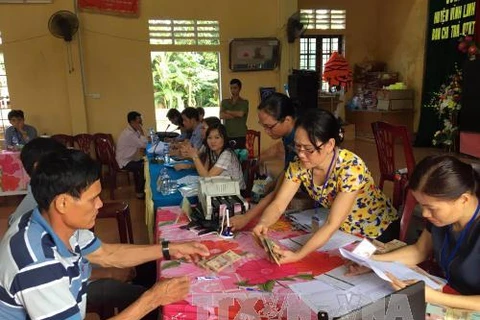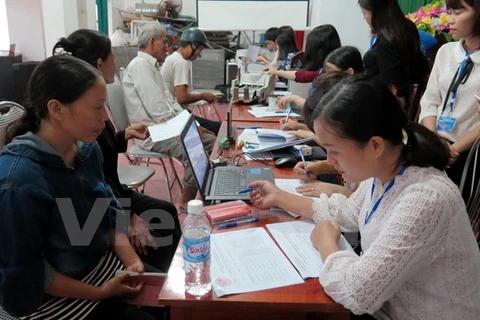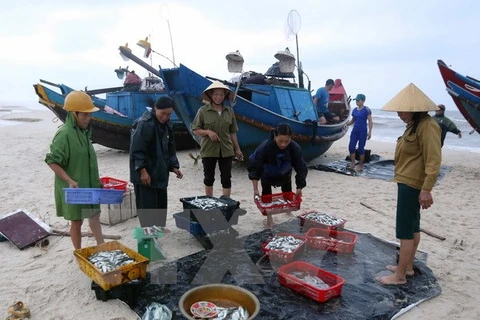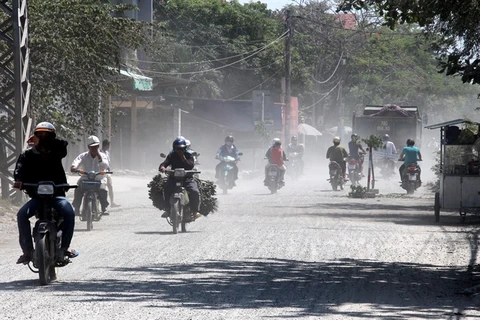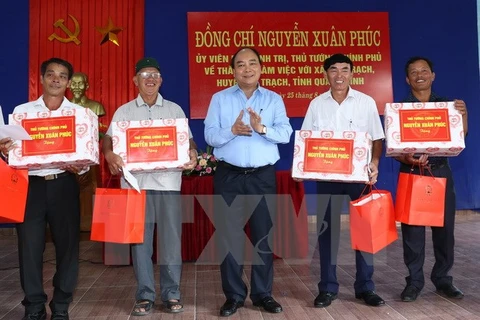Quang Tri (VNA/VNS) - Nearly two years after the 2016 Formosa toxic spill, fishermen in the coastal province of Quang Tri are slowly returning to the sea or finding alternative livelihoods.
Having spent all his life on the water, Nguyen Trung, a middle-aged fisherman of Hai Khe commune in Hai Lang district, had never thought that the only life he knew would be taken away.
The en masse fish deaths caused by the Formosa steel plant in April 2016 upended his family’s life overnight. From a reasonably well-off family in the area, they struggled to make ends meet in the following ten months.
Fortunately, by the end of 2016, through the district Farmer’s Union and Women Union, Trung was able to get a preferential loan of 60 million VND (2,640 USD) from the Quang Tri Province Bank for Social Policies (BSP) to repair his boat, buy new fishing tools and start over again.
“Offshore fishing has picked up some positive signs recently. The industry is gradually recovering although the catch and seafood prices are not as good as they were before the tragedy.
“Each fishing trip, we can earn between 500,000 VND to one million (22 – 44 USD). In the gloomiest period, thanks to the BSP, we got the motivation to pick ourselves up,” he told Viet Nam News.
The BSP’s preferential loans for coastal residents have helped many people.
Pham Thi Xanh of Trung Giang commune, Gio Linh district, borrowed 40 million VND (1,760 USD) to switch from extensive shrimp farming to poultry breeding, and reclaim a marshy piece of land behind her house to grow spices. The new job gave her a steady income while waiting for fisheries activities to recover after the incident.
From April 2016 to June 2017, the Quang Tri branch of BSP granted 4,072 loans to residents in 16 coastal communes, disbursing about 129 billion VND (5.7 million USD).
At present, the bank is advising people on shifting from fishing to sustainable farming models, apart from helping fishermen upgrade fishing tools and vessels, restore fish cages and expand to other sectors.
Old skills, new vocations
Ho Xuan Duc, deputy chairman of the Trieu Van commune People’s Committee in Trieu Phong district, stressed the significance of agriculture as an alternative livelihood for the fishermen and their families.
He said the local economy had depended heavily on the fishing industry and marine logistics services. Therefore, the district authorities carried out studies to identify alternative livelihood projects based on people’s skills.
“In addition to intensive farming of rice, we encourage people to expand the area of plants grown on sandy soil, like black peas, cucumbers and bitter melons, apply intercropping techniques and rotational cultivation for greater yield. So far, several farming models have been developed in the commune and they have started doing well,” he said.
Nguyen Trieu Thuong, head of the Trieu Phong People’s Committee, said authorities gave priority to people directly affected by the incident, including fishermen and fisheries workers.
“We conducted vocational training courses, firstly, for fishermen. In localities with limited land, the courses focused on shipbuilding and repairs or mechanical work,” she said.
According to Duc, since the first quarter of 2017, 40 family-sized farms have been developed under the district’s livelihood stabilisation projects. The production value of each farm is about 2 billion VND (88,000 USD) a year.
Le Quang Thao, Bui Thi Oanh in Sinh Thai Ward and Phan Thi Truc in Ward 9, Trieu Van commune, Trieu Phong district are among other fishermen or women who have successfully switched into poultry and cattle farming applying the VAC (garden – fish pond – poultry shed) and VACR (garden – fish pond – poultry shed – paddy field) models.
Besides the local authorities’ efforts, several fishermen have taken initiatives to stabilise their lives.
Phan Anh Trong, a resident of the coastal town of Cua Viet in Gio Linh district, has developed the first canary farm in the region and begun earning good profits.
Ho Thi Hang of Trieu Van commune in Trieu Phong district, said: “This year, I plan to expand the area of bitter melon and green-fleshed black bean as the consumption of these vegetables has been growing fast of late.” - VNA/VNS
VNA

